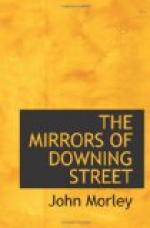His activity is enormous, but it is the activity of the scholar. He works far into the night, takes little or no exercise, and avoids “that dance of mimes”—the life of society. By hard reading he keeps himself abreast of knowledge in almost every one of its multitudinous departments and will go a long journey to hear a scientific lecture or to take part in a philosophical discussion. He is the friend of philosophers, theologians, men of science, men of letters, and many a humble working man. He was never privately deserted in the long months of his martyrdom. His charming London house, so refined and so dignified in its simplicity, was the frequent meeting-place of many even in those bad days when the door outside was daubed with paint, the windows broken, and a police-man stood on guard. A few of us wished he took his ill-treatment with a fiercer spirit; but looking back now I think that even the youngest of us perceives that he was unconsciously teaching us by his behaviour one of the noblest lessons to be learned in the school of life.
Let his fate teach democracy that when it has found a leader whom it can trust, it must be prepared to fight for him as well as to follow him. No statesman is safe from the calumny of newspapers, and no statesman violently and persistently attacked in a crisis can depend upon the loyalty of his colleagues. It is not in our politics as it is in our games.
FOOTNOTE:
[2] It is well known that Lord Haig regards Lord Haldane as the greatest Secretary of State for War that England ever had; he has expressed his gratitude again and again for the manner in which Lord Haldane organized the military forces of Great Britain for a war on the Continent. Lord French has said: “He got nothing but calumny and abuse; but the reward to such a man does not come in the ordinary way. I had proved the value of his great work and that is all the reward he ever wanted.”
LORD RHONDDA
LORD RHONDDA OF LLANWERN (DAVID ALFRED THOMAS MACKWORTH)
First Baron, 1916. Born, in Aberdare, Wales, 1856; died, 1919. Educated with tutors, and later at Caius College, Cambridge; Scholar also, of Jesus; President South Wales Liberal Federation, 1893-97; M.P. for Merthyr, 1888-1910; for Cardiff, 1910; Food Controller, 1917-1919.
[Illustration: LORD RHONDDA]
CHAPTER XI
LORD RHONDDA
"Whereof what better
witness can ye expect I should produce than
one of your own now
sitting in Parliament."—MILTON.
In the Merry Passages and Jests of old Sir Nicholas Lestrange record is made of the following witty definition: “Edm. Gurney used to say that a mathematitian is like one that goes to markett to buy an axe to break an egg.”




